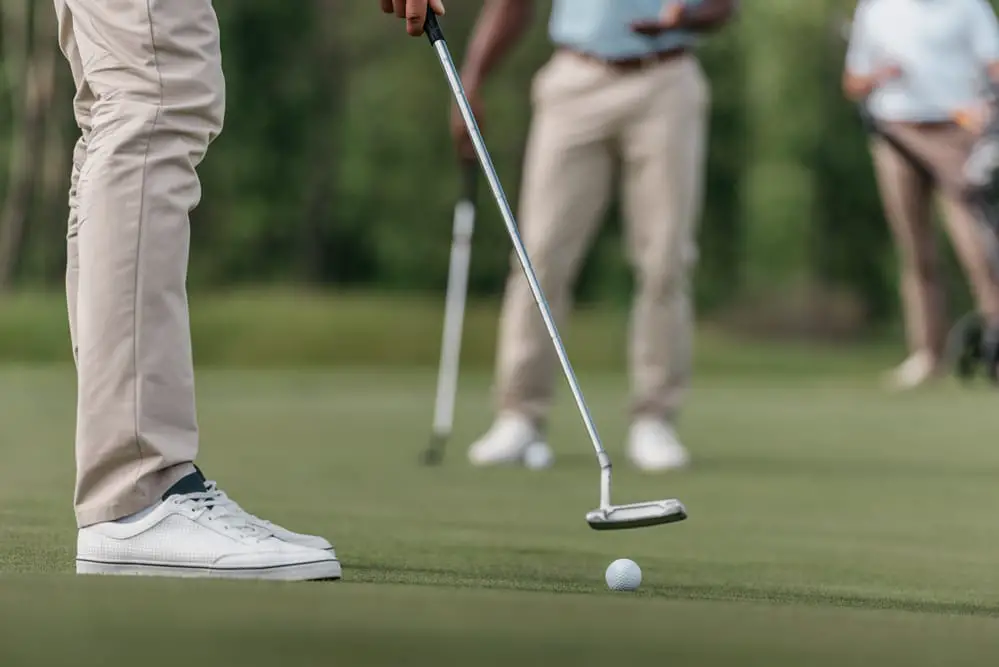Last Updated on June 7, 2023
Golf is a sport that requires skill and finesse. The game relies on an individual’s ability to hit the ball accurately from long distances, as well as their short-game skills. A successful golf player must be able to execute each shot with precision, including those in the short game. Improving one’s short game can significantly improve scores, making it essential for all golfers to focus on mastering this part of the sport. This article will discuss how individuals can improve their short game in golf by focusing on technique and practice drills.
Fundamentals of a Good Short Game
The fundamentals of a good short game involve understanding basic golf concepts such as ball position and stance width in relation to the target line; utilising certain swing mechanics like maintaining balance throughout the shot or keeping hands low through impact; and having an idea of how hard to hit each shot depending on the distance from the green or flagstick. It is also important to practice visualisation when playing any type of shot around the green so that one can better understand what kind of trajectory they want their ball to take after contact with the clubface occurs. Lastly, it is always beneficial to have a plan prior to beginning any golf round; knowing which types of shots are best suited for different situations will help keep scores lower over time.
By mastering these fundamental elements of golf’s short game, players can improve their overall ability level on the course without needing extensive range work or technical knowledge about swing technique. With enough practice and dedication towards improving this aspect of golfing skill set, even those relatively new to the sport can make significant progress towards becoming an accomplished player.
Benefits of Improving Your Short Game
Having a good short game is essential to having success in golf. It can mean the difference between good and bad scores or even being able to make par on a hole. Improving your short game offers many benefits that will help improve your overall game of golf:
- Lower handicap: Developing a better short game allows you to reduce your number of strokes per round, resulting in lower overall handicaps. This allows for more consistent playing across different courses and conditions.
- Better golf scores: As you become proficient with chipping and pitching around the green, it becomes easier to get onto the green from off-the-tee shots, which leads to fewer putts per hole. This results in lower scores over time as you learn how to play smarter instead of harder.
- Increased confidence: Improved performance on shots around the green boosts self-confidence and lowers stress levels when faced with difficult lies or awkward angles that would otherwise give players difficulty. With practice, these shots become manageable and less intimidating as one’s skill level increases.
The improved accuracy of shorter shots also leads to more accurate long-range approaches into greens, giving players greater control over their approach shot placement and ball flight trajectory, which reduces the chances of missing greens altogether.
Swing Mechanics Tips and Techniques

Swing mechanics are an important part of improving any golfer’s short game. As a player develops their skill in the short game, they should focus on developing proper swing technique to ensure maximum control and accuracy when hitting shots. One key point for golfers is to keep their head down during the entire swing rotation so that they stay focused on the ball throughout the shot. Additionally, it is important to maintain balance by keeping their feet planted firmly on the ground and utilising their core muscles to generate power from their torso.
In terms of hand placement, a golfer should grip the club lightly but with enough pressure to control its movement through impact. This ensures that there isn’t too much torque applied to the shaft, which can cause excessive spin or misdirection of the ball’s path. The angle of attack should be shallow and consistent, as this will help prevent fat shots caused by digging into the turf too hard. Similarly, making sure not to lift up at impact helps create better contact with the ball while also preventing slicing due to over-rotation of wrists during the follow-through.
Developing the Right Mental Approach for a Good Short Game
Golfers need to have the right mental approach in order to achieve a good short game. This is because it requires certain psychological traits, such as confidence and focus, which can be difficult for some golfers to attain. It is important to develop an effective attitude when approaching your short game so that you are able to generate positive results consistently.
| Mental Approach | Short Game Attitude |
|---|---|
| Confidence | Positive |
| Focus | Consistent Performance |
Having the necessary skillset and understanding of golf psychology will help improve your chances of success on the course. Being aware of common pitfalls like overthinking or getting frustrated by poor shots will allow you to recognise when these feelings arise and work through them effectively. Additionally, maintaining a relaxed mindset while playing can also contribute greatly towards creating a successful environment during your round. As a result, having an appropriate mentality before tackling any shot increases your likelihood of finding success with your short game and ultimately improving your overall performance on the course.
Practising Effectively to Improve Your Short Game

Practising your short game is essential to improve on the golf course. To ensure you make steady progress, it’s important to follow a plan that includes drills and practice sessions tailored to your individual needs. Here are some key tips for effective short-game practice:
- Establish specific goals – Break down your overall goal into more achievable objectives and measure your progress over time.
- Focus on technique – Practising with good form helps build consistency in performance. Spend time perfecting each shot rather than just hitting balls randomly.
- Practice regularly – Set aside time each day or week for focused drill work and repetition of common shots from around the green.
- Modify based on results – If something isn’t working well, try different techniques until you find the one that works best for you.
- Incorporate short game drills – Choose appropriate golf practice drills to develop a consistent swing path and strike while keeping an eye out for improvement opportunities.
By following these guidelines, players can create their own practice routine that is tailored specifically to their strengths and weaknesses in order to maximise gains in their short-game skillset. When structuring short game practices, use progressive drills starting with shorter distances before increasing difficulty as proficiency grows. Additionally, track scores during rounds to identify areas requiring further attention during practice sessions, such as chipping accuracy or putting speed control.
Working With a Coach
One of the best ways to improve one’s short game in golf is by working with a coach. A good coach can help identify areas where improvement can be made, as well as teach proper technique and form for certain shots. Working with a coach often requires an investment of time and money; however, it can pay dividends when it comes to improving one’s golf game.
| Benefits | Drawbacks |
|---|---|
| Focused instruction from an expert | Costly lessons or membership fees |
| Immediate feedback on swings/shots | Time-consuming commitment |
| Showcase personal strengths & weaknesses | Need to find qualified coach |
By having direct access to a short-game coach, golfers are able to receive immediate feedback on their swings and get advice tailored specifically for them. Furthermore, this allows players to showcase both their strengths and weaknesses throughout the process. However, finding a reliable and trustworthy golf coach may require some research before committing financially. In addition, taking frequent golf lessons could accumulate costs over time which could potentially become expensive. Lastly, making regular visits to a course or instructor will consume valuable time that otherwise would have been spent playing rounds of golf or practising independently.
Conclusion
Golfers must develop their short game in order to become more successful on the course. Taking time out of a practice session to focus specifically on this area can be beneficial for any golfer, both amateur and professional alike. By having an understanding of what type of clubs should be used, how much time should be devoted to practising the short game, which drills are most effective, and when instruction from a coach is necessary, golfers will have all they need to improve their short game.
In summary, golfers looking to enhance their short games need only take some simple steps toward improvement: selecting appropriate equipment suited for individual comfort levels, devoting adequate amounts of time towards repeating certain drills, and seeking out qualified coaching services if needed along the way. With attention paid to these areas, success on approach shots and putting will soon follow suit.


